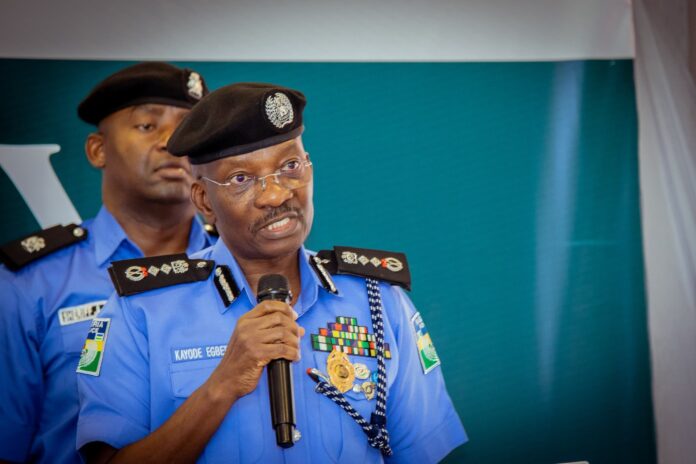The Inspector-General of Police (IGP), Kayode Egbetokun, has announced a nationwide ban on the public parade of criminal suspects before the media. The decision, which was made public on Tuesday, aims to uphold the fundamental human rights of individuals and align with global best practices in modern policing.
The IGP’s directive, which was communicated through the Force Public Relations Officer, Assistant Commissioner of Police (ACP) Olumuyiwa Adejobi, reaffirmed the existing policy that prohibits the display of suspects before formal charges are brought against them in court.
According to Adejobi, the directive had already been sent to all police commands and zones across the country, and officers are expected to strictly comply with the order. He noted that this move reflects the commitment of the Nigeria Police Force (NPF) to ensuring that all individuals, including those accused of crimes, are treated with dignity and in accordance with legal and ethical standards.
A Step Towards Modern Policing
Egbetokun’s directive is part of broader efforts to reform Nigeria’s policing system and bring it in line with international human rights principles. Parading suspects before the media has long been a controversial practice in Nigeria, as it exposes individuals to public shame and potential bias before they have had their day in court. Human rights groups have repeatedly criticized the practice, arguing that it violates the presumption of innocence—a fundamental principle of justice that holds that suspects are innocent until proven guilty.
For years, law enforcement agencies in Nigeria have faced criticism over human rights abuses, including extrajudicial actions and public shaming of individuals yet to be convicted of crimes. This latest directive by the IGP appears to be a response to these concerns, signaling a shift towards a more professional and rights-based approach to policing.
Police Officers Ordered to Comply
The IGP has issued a firm warning to all senior officers in charge of commands and formations across the country, instructing them to abide strictly by the directive. Any officer found violating the order will face disciplinary action, as the police force moves to strengthen its adherence to legal and ethical policing practices.
“The Nigeria Police Force is committed to operating within the bounds of the law and promoting a culture of respect for human rights among its personnel,” Adejobi stated while addressing journalists.
This directive is not only meant to protect the dignity of suspects but also to ensure that the police force functions within the confines of the law and fosters public trust. Many Nigerians have long expressed concerns that the parade of suspects, sometimes before a proper investigation is concluded, could lead to wrongful accusations and irreparable damage to reputations.
Support from Human Rights Advocates
Human rights organizations and legal experts have welcomed the IGP’s directive, describing it as a step in the right direction.
“This is a long-overdue decision. Publicly parading suspects before they have been convicted is a direct violation of their constitutional rights,” said Barrister Emmanuel Ojo, a human rights lawyer based in Lagos. “This practice often leads to media trials, where the court of public opinion passes judgment before the legal system has had the opportunity to determine guilt or innocence.”
Legal practitioners have also pointed out that suspects who are eventually found not guilty suffer lasting reputational damage, which sometimes affects their ability to reintegrate into society. There have been cases where individuals paraded as criminals were later acquitted, but the stigma of the public display remained with them for life.
Public Reactions and Concerns
While many Nigerians have welcomed the directive, others remain skeptical about its enforcement.
“I hope this ban is implemented in full, not just on paper,” said a Lagos-based journalist, Ayo Olatunji. “We have seen policies like this before, but some officers still find ways to flout the rules. The police need to ensure that this is strictly enforced.”
Some citizens believe the directive should be followed with additional reforms, including better investigative practices and improved training for police officers to ensure that suspects’ rights are protected at all stages of the legal process.
Others have raised concerns about how the directive might affect public awareness of crime. In the past, police parades have been used to show the public that law enforcement agencies are making arrests and tackling crime effectively. With the ban in place, some citizens worry that the public may not be adequately informed about police efforts to combat criminal activities.
Police Seek Media Cooperation
The IGP has also urged the media to cooperate by ensuring that reporting on criminal cases remains ethical and does not contribute to the stigmatization of suspects.
“The IGP seeks the understanding and cooperation of the public, particularly members of the media, in adhering to this directive,” Adejobi said. “Responsible reporting and adherence to ethical journalistic practices are vital in maintaining public trust and ensuring a fair and impartial justice system.”
Share
Read more

